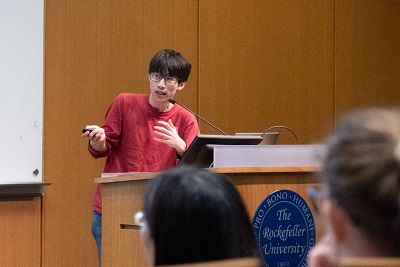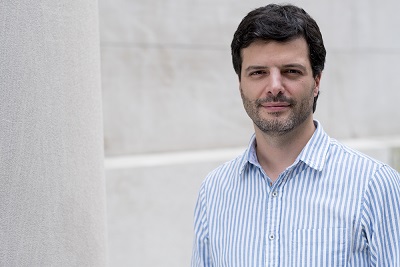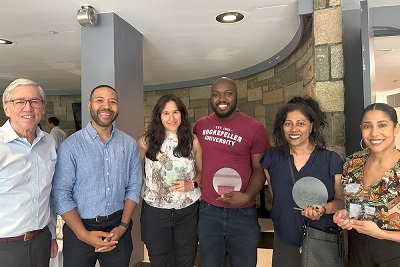Rockefeller’s annual Celebrating Science benefit raises $2.8 million, an all-time record

President Rick Lifton with honorees Judy and Russ Carson at this year’s Celebrating Science benefit on November 2.
Last month, 400 guests gathered on campus for cocktails, a lecture on next-generation genomics given by Robert B. Darnell, and a festive dinner. The event—Rockefeller’s fifth annual Celebrating Science benefit—raised a record $2.8 million for the university. Sponsored by Rockefeller’s Parents & Science initiative and hosted by President Richard P. Lifton, this year’s benefit honored Board Chair Russ Carson and his family for their commitment to the university as well as for their numerous philanthropic efforts in New York City.
For the past decade, the Parents & Science initiative has been working to promote scientific literacy and education. Through its various programs, including a complimentary lecture series, the initiative offers a forum for New York–area parents, educators, and Rockefeller scientists to discuss cutting-edge research pertaining to childhood and adolescent health and behavior. The funds raised by the Celebrating Science benefit will support these programs and provide vital resources for Rockefeller scientists whose work is advancing the understanding of human development and childhood diseases.
Ambassadors for Rockefeller’s mission
The evening’s guests of honor, Russ Carson and his family, have been involved with Rockefeller for 25 years. Mr. Carson, who is a co-founder of private equity firm Welsh, Carson, Anderson & Stowe, joined Rockefeller’s Board of Trustees in 1994 and has served as its chair since 2005. He led the search committees that brought presidents Marc Tessier-Lavigne and Dr. Lifton to Rockefeller. The university has thrived during his chairmanship, with 25 new faculty members recruited thus far and greatly expanded facilities. By 2019, it will have added or refurbished more than 260,000 square feet of lab space, including the new Stavros Niarchos Foundation–David Rockefeller River Campus.
“The Carson family are extraordinary ambassadors for our mission of science for the benefit of humanity,” Dr. Lifton said in his opening remarks. “Tonight, we’re recognizing them for their long involvement and generous contributions, not only to Rockefeller but throughout New York City.”
The Carson family has served 35 different philanthropies in New York City alone. They are involved in institutions ranging from the New York Genome Center, which Mr. Carson helped found, to the Metropolitan Museum of Art and the National September 11 Memorial Museum. He and his wife, Judy, herself a member of both The Rockefeller University Council and the Women & Science committee, are also interested in improving K–12 education for the city’s students. Among other initiatives, they co-founded the Partnership for Inner-City Education, a management organization for six Catholic elementary schools in Harlem and the South Bronx. Their daughter, Cecily, is president of the Carson Family Charitable Trust and a trustee of the Robin Hood Foundation, while their son, Edward, and his wife, Madeline, are active in the family’s philanthropic efforts in Brooklyn.
“Philanthropy is a family affair for the Carsons,” said Richard E. Salomon, vice chair of Rockefeller’s Board, in his tribute. “The charitable work embraced by Russ and his family has had a profound impact on the lives of untold numbers of people, including many who benefit from the discoveries made in Rockefeller laboratories.”
Hands-on discovery
At the end of the evening, the Celebrating Science attendees—a group that included Rockefeller scientists, trustees, Parents & Science donors, and friends—were invited to participate in an auction. Guests bid on two educational opportunities: a personalized lab experience and an afternoon science camp for students. The camp, run by Rockefeller’s Science Outreach program, will offer a preview of some of the interactive demonstrations being developed for next year’s Science Saturday festival.
In his remarks at the benefit, Mr. Carson described Rockefeller as a unique institution. “Each of our scientists can pursue whatever avenue of inquiry they want to, and they turn out brilliant work. They do it time after time after time,” he said. “There is nothing anywhere in the world quite like Rockefeller.”


